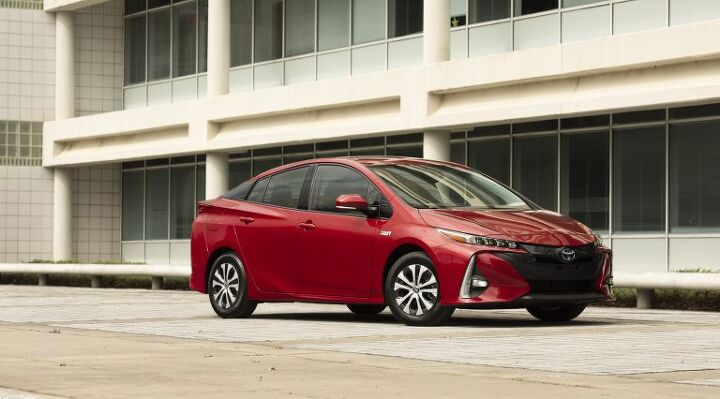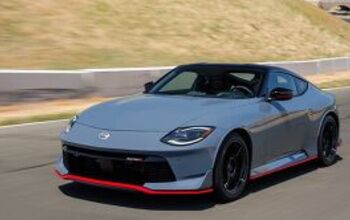Report: Toyota Working Against EV Shift

In case you missed it over the weekend, The New York Times had a report suggesting that Toyota is quietly working to slow the automotive industry’s shift to electric vehicles.
Yes, that Toyota. The same one that has been praised for its development of gas-electric hybrids. The same one that uses one particular hybrid — the Prius — as an avatar for its green cred.
The Times reports that Chris Reynolds, a top executive in charge of the company’s government affairs, traveled to Washington, D.C. last month to meet with congressional staffers and argue that an aggressive approach towards shifting the market towards EVs would be something that Toyota would be opposed to.
Instead, he argued that gas-electric hybrids and hydrogen-fueled vehicles need to play a bigger role in any market shift towards “greener” cars.
That pretty much answers the question of “why” — Toyota is arguing for hybrids and hydrogen because the company has placed big bets on those technologies.
As the Times notes, Toyota has invested in hydrogen fuel cells, and that technology costs more and is far behind electric batteries when it comes to development. Hydrogen is also not easily available, at least not as a fuel source for passenger vehicles.
Toyota has also bet on hybrids to be a near-term bridge technology — a sort of placeholder until hydrogen tech is ready for prime time.
This means a fast shift from internal-combustion engines to battery-electric vehicles could catch Toyota flat-footed and cost the company a lot of money and opportunity. After all, it’s not easy for an automaker that has bet on the wrong technology to quickly pivot, thanks to the long lead times required to develop new products/technology.
If an automaker bets wrong on a given technology, it has few options. One is to try to make its chosen tech the tech of choice for the rest of the market. Another is to buy time while it tries to do that — or to buy time until it can pivot to using a different technology.
According to the Times, Toyota has been opposing stricter emissions standards and/or EV mandates in the U.S., U.K., Europe, and Australia. Oh, and India, too — the automaker said India’s goal of 100 percent EV adoption by 2030 was impractical.
You’ll also remember that Toyota was one of the automakers that took the Trump administration’s side in the fight with California over the Clean Air Act. It has also sued Mexico over fuel-efficiency regulations and fought against carbon taxes in its home country of Japan.
More from the Times:
“Toyota has gone from a leading position to an industry laggard” in clean-car policy even as other automakers push ahead with ambitious electric vehicle plans, said Danny Magill, an analyst at InfluenceMap, a London-based think tank that tracks corporate climate lobbying. InfluenceMap gives Toyota a “D-” grade, the worst among automakers, saying it exerts policy influence to undermine public climate goals.
Furthermore, the Alliance for Automotive Innovation pushed back on the Biden administration, which is rumored to be using the compromise between the Trump administration and California over the Clean Air Act as a model for its proposed standards, saying that the standards wouldn’t be feasible for all its members. Toyota is a member, and Reynolds is the Alliance’s chairman.
The Biden administration is hoping that stricter fuel-economy standards will accelerate the shift to EV sales, and Congress could approve billions of dollars for charging infrastructure and tax incentives related to EVs.
An Alliance spokesman claimed to be unaware that any of its members claimed the California compromise wasn’t feasible. The Alliance is pushing for standards that meet somewhere in the approximate middle between the Trump-era standards and the standards that were in place during the Obama administration.
Toyota also recently caught flak, including from us, for donating to politicians that pushed the Big Lie that the 2020 election was stolen. Some of those same politicians have denied the scientific consensus regarding human-driven climate change, according to the Times.
Toyota of course disputed that it has pushed back on EV adoption. “We agree and embrace the fact that all-electric vehicles are the future,” Eric Booth, a Toyota spokesman, told the Times. He also said “too little attention is being paid to what happens between today, when 98 percent of the cars and trucks sold are powered at least in part by gasoline, and that fully electrified future,” however.
We reached out to Toyota for comment and a PR rep sent us the below statement that echoes what Booth told the Times.
“Toyota believes climate change is real and we are acting in earnest to reduce greenhouse gas in our vehicles and operations with the ultimate goal of achieving carbon neutrality. We also agree and embrace the fact that all-electric vehicles are the future, and there are multiple possibilities to achieve this, including battery and hydrogen-powered fuel cell electric vehicles. Back in 2015, we announced our plans to reduce our global average CO2 emissions from new vehicles by 90 percent by 2050 (compared to Toyota’s 2010 levels). To help accomplish that goal, in the short-term we are taking the opportunity to reduce carbon by leveraging our existing hybrid and plug-in hybrid electric vehicles that are available today to consumers with minimal impact to their lifestyle with our expanding line-up. In parallel, we continue to develop technologies, supply chains, and products to make the future of mobility affordable, safe, and reliable in order to meet the demands of our customers. This includes a significant investment in battery electric vehicles.”
[Image: Toyota]

Tim Healey grew up around the auto-parts business and has always had a love for cars — his parents joke his first word was “‘Vette”. Despite this, he wanted to pursue a career in sports writing but he ended up falling semi-accidentally into the automotive-journalism industry, first at Consumer Guide Automotive and later at Web2Carz.com. He also worked as an industry analyst at Mintel Group and freelanced for About.com, CarFax, Vehix.com, High Gear Media, Torque News, FutureCar.com, Cars.com, among others, and of course Vertical Scope sites such as AutoGuide.com, Off-Road.com, and HybridCars.com. He’s an urbanite and as such, doesn’t need a daily driver, but if he had one, it would be compact, sporty, and have a manual transmission.
More by Tim Healey
Latest Car Reviews
Read moreLatest Product Reviews
Read moreRecent Comments
- Dave M. What???? Big business taking advantage of us? I thought it was all Biden's fault!?!
- OA5599 Now if we could only get Toyota to change BZ4X...
- FreedMike You mean the petroleum market is manipulated and doesn't respond to normal supply/demand? No way. Can't be. This, folks, is why electrification is important - the only reason why the petroleum industry gets away with this is because they were the only game in town for over a century. That has GOT to change or we'll keep getting ripped off.
- JMII Ironically, it’s actually the oil companies themselves that have walked back production as a way to maintain higher prices.You don't say? I'm shocked. I thought we could just wave a magic wand and lower gas prices.
- Jkross22 You know that feeling you get when you're nervous and you can feel it in your gut? Everytime I see one of these I get that. Yeah, they look great. Yeah, it'll be the worst decision of the year. And next year. And the year after that.

































Comments
Join the conversation
The Bolt is GM's slowest-selling passenger car. In California, people are already trading in their EV's due to the shortage of charging stations. Toyota is now twice the size of GM. Due to the economy of scale, it is GM that is "screwed".
If you do a search into the bowels of TTAC into the early days, there is a story pre-great recession where Toyota senior leadership took a big dump on electric cars. They saw them as a dead-end and that the path forward was hybrids and eventually hydrogen fuel cell. The Tesla mashup was short lived but almost 15 years later hydrogen appears to be the real dead-end and electrification is the way this is going to go (I for one will not welcome our electric car overlords, but I accept that's where it will go in my lifetime). So I'm not shocked now that they want to slow the train down, because they are behind many other makers now in their own R&D, infrastructure and development.